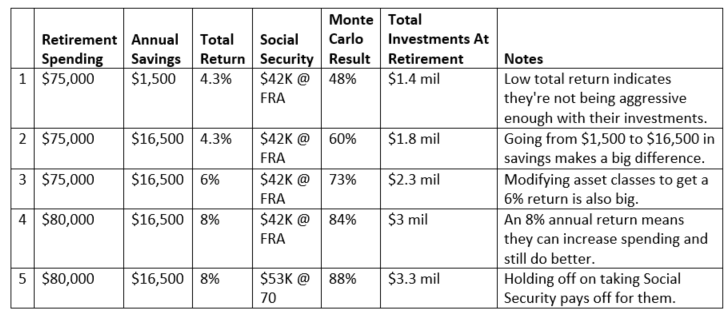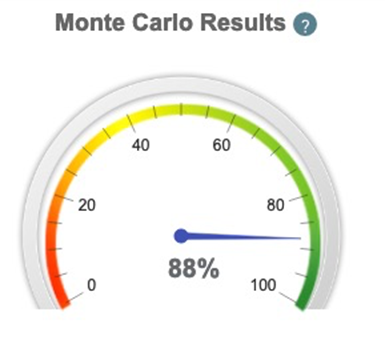Key Points
- There are many variables that apply to nearly every future retiree, and yet no two retirement plans are alike.
- It's important to understand the factors that will have the greatest impact on your retirement plan. How much to save for retirement is one of the most important.
- Putting it all together using a software program like WealthTrace is the best way to look at all of the evolving variables, and stress test them.
It's one of those questions with no one-size-fits-all answers: How much do you need to save for retirement?
There's so much that goes into answering this question--and so much that depends on your unique circumstances. In this article, we'll first highlight some general points, and then run through a few scenarios using WealthTrace to see how different saving levels--and different projected income levels--might affect a retirement plan.
Simply Complex (Or Complexly Simple)
As difficult as it is to predict how much a specific person or couple needs to save for retirement, it really boils down to just a few items.
Age. That is, both your current age and your retirement age. If you're young, you have time to save; if you're older, you have less time to save (which is where catch-up contributions come into play).
But to the degree that general rules apply, you should be saving in the range of 10% to 15%, pretax, during your working years. You can count your employer's matching contribution (if any) to your 401(k) in this figure. (And if you can max it out, all the better.)
Spending. Some think of this item as income needs; we tend to think of it as spending needs. But it's really both sides of the same coin: What do you plan to spend in retirement, and what, if anything, do you plan to leave behind to heirs?

You'll have day-to-day spending needs as well as expenses that come and go over time in retirement, just as you do now. So while it's tough to predict how much that will change in retirement, you should at least have a sense of it. If you're the type who uses a budget, great; if you're not, and can't be convinced to become the type, at least track the outflows from your bank account over some period of time, preferably a few years, to see what your spending "run rate" is. Then you can start to back out expenses that will go away (do you have kids in the house?) and add in expenses that will likely appear (more traveling, perhaps).
Finally--and this isn't really spending, but kind of--what do you want to leave behind? This might include passing along investments or assets to heirs or to charity. Some people like to budget for this, and some people don't give it much thought. You'll want to decide which side to take.
Other Income Sources (besides your investments). Perhaps you're fortunate enough to have a pension coming; hopefully you've been paying into Social Security and can look forward to that benefit.
You might have other sources of income on the horizon as well. Is an inheritance, for example, a sure thing? What about if you plan to sell your home and downsize a bit? That could lead to a bit of a windfall. Try to think through what other income might be coming your way.
Which Factors Matter Most?
Let's take a look at some factors that can affect the outcome of a retirement plan, with an emphasis on savings rates, total returns, and sources of income.
In our case study, a couple in their late 40s with around $1.5 million in investments is hoping to retire at 65. They'd like to know what they need to do to get there--and stay there--safely.
To be able to put some scenarios into a grid like the one below, we had to make certain compromises and assumptions. For one, retirement spending often varies (and WealthTrace allows you to vary it), but that doesn't lend itself to presenting the data like this, so we made the amount fixed.
Also, inflation is mostly beyond the scope of this article, but in the table below, we assume 7% inflation for the next couple of years, 4% for three years after that, and 2.2% for the remainder of the plan. (And by the way, if you haven't stress tested your plan using different inflation rates, you should, as it can have a dramatic effect. WealthTrace allows you to vary inflation rate assumptions over time.)

There's a lot going on in this table, so let's take it row by row.
In row 1 we have our base case. On a straight-line, no-bear-market basis, they have $1.4 million at retirement. That sounds pretty good. But Monte Carlo--which takes into account asset class correlations and body blows to the stock market--tells a different story. That story? At a 48% probability of success, this plan isn't going to cut it.
Once our couple starts saving money to their retirement accounts for real in row 2, things get a fair amount better, but there's still more work to do. In addition to not saving enough, their total return numbers indicate that they're being far too conservative with their asset allocation. Getting that total return figure up to 6% in row 3 certainly helps things along.
Row 4 sees them increasing their annual retirement spending allowance by $5,000, and also once again changing up their asset allocation to bump up their total return number to something achievable (8%) for people their age. We're definitely getting warmer.
Finally in row 5, we assume they wait past full retirement age (that's what that FRA stands for) to age 70 to take their Social Security benefits, getting them to a quite respectable 88% probability of success for their plan.

More Than One Way Across The Finish Line
How much should you save for retirement? That's up to you. But don't just wing it. Make sure you know where the potential for danger in your plan lies, and try to address that danger. WealthTrace can make it a whole lot easier to do that.
Do you know how much you need to save for retirement? If you aren’t sure, sign up for a free trial of WealthTrace to get started on your financial and retirement planning.